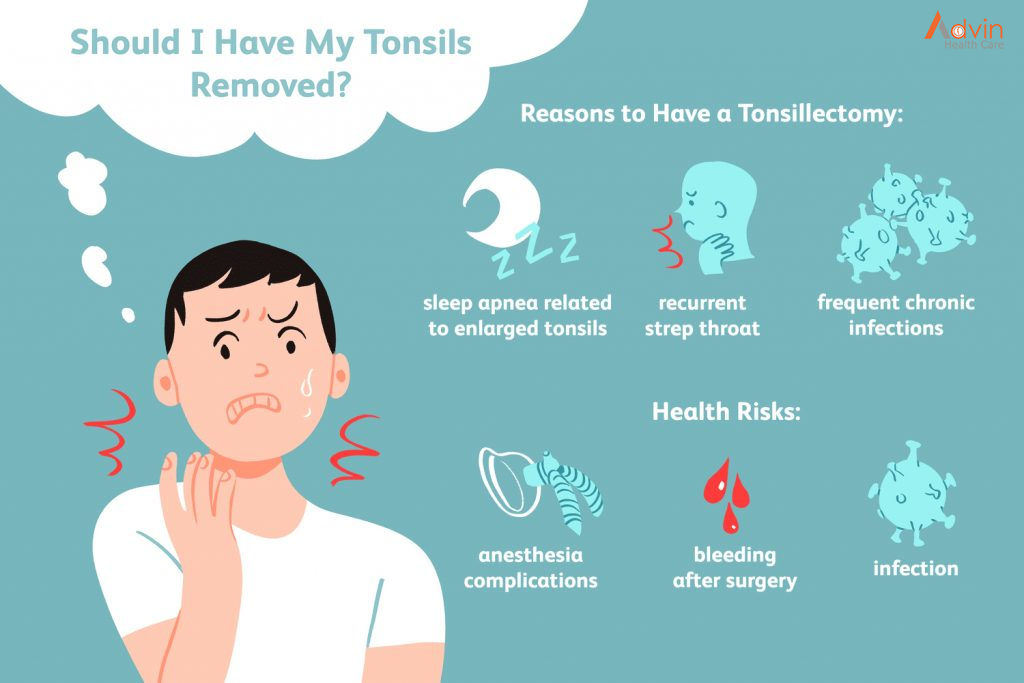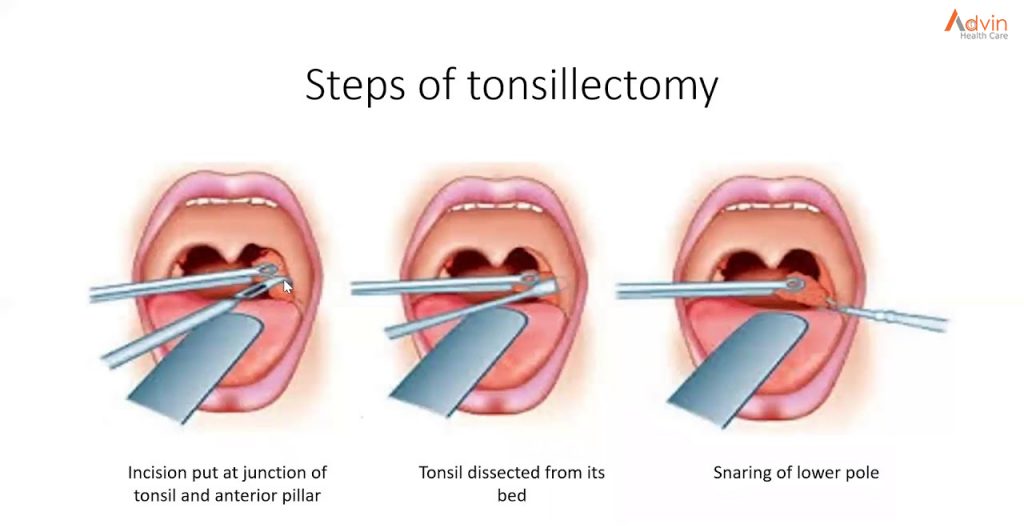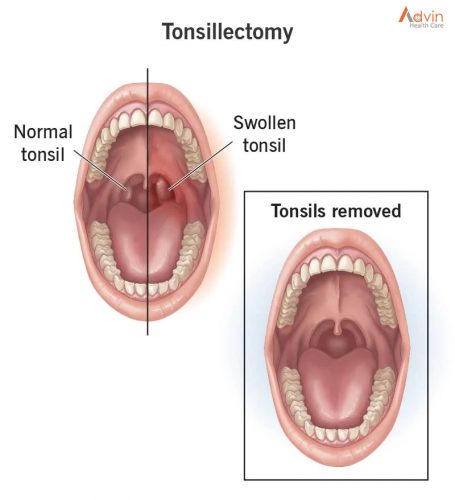Tonsillectomy (ton-sih-LEK-tuh-me) is the surgical removal of the tonsils, two oval-shaped pads of tissue at the back of the throat — one tonsil on each side.
A tonsillectomy was once a common procedure to treat infection and inflammation of the tonsils (tonsillitis). Today, a tonsillectomy is usually performed for sleep-disordered breathing but may still be a treatment when tonsillitis occurs frequently or doesn’t respond to other treatments.
A tonsillectomy may also be necessary to treat breathing and other problems related to enlarged tonsils and to treat rare diseases of the tonsils.
Recovery time for a tonsillectomy is usually at least 10 days to two weeks.
Why is tonsillectomy done?

Healthcare providers recommend tonsillectomy for two main reasons:
- To treat breathing-related sleep disorders, such as sleep apnea.
- To reduce the risk of infection in people with frequent or chronic tonsillitis.
While most tonsillectomies treat children, adults can also benefit from the procedure.
Tonsillitis
The tonsils are the immune system’s first line of defense against bacteria and viruses that enter your mouth. This function may make the tonsils particularly vulnerable to infection and inflammation. However, the tonsil’s immune system function declines after puberty — a factor that may account for the rare cases of tonsillitis in adults.
A tonsillectomy may be recommended to prevent frequent, recurring episodes of tonsillitis. Frequent tonsillitis is generally defined as:
- At least seven episodes in the preceding year
- At least five episodes a year in the past two years
- At least three episodes a year in the past three years
The procedure may also be recommended if:
- A bacterial infection causing tonsillitis doesn’t improve with antibiotic treatment
- An infection that results in a collection of pus behind a tonsil (tonsillar abscess) doesn’t improve with drug treatment or a drainage procedure
What happens before a tonsillectomy?
Before surgery, your healthcare provider will do a routine check to make sure you’re healthy enough for surgery. They may also request blood tests.
Your healthcare provider will give you a list of detailed preoperative instructions. You should follow these guidelines closely.
What happens during a tonsillectomy?

Your healthcare provider will give you general anesthesia to keep you asleep and comfortable during your procedure. Next, they’ll remove your tonsils. You won’t feel pain during this step. Surgeons use many methods to perform tonsillectomies, including:
- Electrocautery: This method uses heat to remove the tonsils and stop any bleeding.
- Cold knife (steel) dissection: A surgeon uses a scalpel (traditional surgical knife) to remove your tonsils. Then, they’ll stop the bleeding with electrocautery (extreme heat) or sutures.
- Snare tonsillectomy: A surgeon uses a special surgical instrument called a snare, which has a thin wire loop at the end. Once your surgeon frees your tonsil, they’ll place this device around it to clamp it off. This helps reduce bleeding.
- Harmonic scalpel: This method uses ultrasonic vibrations to remove your tonsils and stop bleeding at the same time.
- Other methods include the use of radiofrequency ablation techniques, carbon dioxide lasers, and/or a microdebrider (which uses a combination of suction and cutting).
How long does a tonsillectomy take?
In most cases, a tonsillectomy takes about 20 to 30 minutes to complete. It could take longer in some instances.
What happens after a tonsillectomy?

After your tonsillectomy, your medical team will transfer you to a recovery area. There, your provider will check your vital signs (blood pressure, heart rate and blood oxygen levels) and make sure there are no postoperative complications.
Tonsillectomy is usually an outpatient procedure. This means you can go home on the same day. Complications are rare, but if they arise, your provider might keep you in the hospital overnight to monitor your progress.
Benefits of Tonsillectomy
Reduced Risk of Infections
There is an episode of tonsillitis when there is a viral or bacterial attack in the throat. Once the infection spreads to the tonsils, these inflame resulting in various symptoms. Thus, if the tonsils are removed completely, the chances of infection developing reduces to almost zero. The person may still be at the risk of colds and flu, but these will cure fast as there are no chances of the infection being chronic.
Lesser Dependency on Medicines
Taking medicines once in a while to curb the infection in the tonsils is considered to be safe. Although antibiotics can kill the infections effectively, the user sometimes has to face side effects such as dizziness, nausea, vomiting, hair fall, etc. Moreover, experts claim that prolonged use of these medicines can result in bacterial resistance to infection-fighting medicines.
Additionally, over time, these antibiotics can kill off the good bacteria along with the harmful ones. Hence, individuals suffering from repeated episodes of tonsillitis or chronic tonsillitis should consider a tonsillectomy to reduce their dependency on these antibiotics.
Better Sleep
Sometimes the tonsils become so large that they obstruct the air passage of the individual resulting in another condition- sleep apnea. The obstructive sleep apnea makes the patient gasp for breath while a person asleep and air doesn’t pass through the nasal airways.
Eventually, the person also has to face a disturbed sleep pattern. In turn, he or she feels tired and unproductive throughout the day. This impacts their regular mood too. Hence, undergoing a tonsillectomy may help them get rid of this problem permanently and help them sleep better.
Lesser Chances of Skipping Work or School
People suffering from tonsillitis of any type have to skip work or school repeatedly. The reason being that tonsillitis is contagious in nature and stepping outside the home can only increase the likelihood of a healthy person getting infected. Also, the symptoms of tonsillitis- fever, bad breath, throat pain, fatigue causes extreme discomfort to the patient. Hence, people tend to be absent from school or work. Once the tonsils are taken out, the person does not have to skip their job or school and enjoy all types of social gatherings.
Enhanced Life
Tonsillitis is a painful condition. This ailment can curb the personal growth of a person and prevent the patient from enjoying life completely. They have to be extremely cautious about their food habits or their lifestyle so that they can minimize the risk of any infection. Also, they have to miss out on various social gatherings in fear of infecting others. Therefore, patients should consider tonsil removal surgery so that they don’t miss out on the fun.
Advin Tonsillectomy Instrument Set
- Scalpel Handle
- Davis Mouth gag
- Draffin Bipod stand for mouth gag
- Yankauer suction Tube
- Lopez reinke tonsil dissector with sucker
- Henke Dissector Double ended
- Mollison Anterior pillar retractor
- Blohmke tonsil grasping forceps
- Toennis adson tonsil scissors curved blunt fine & delicate
- Laryngeal mirror
- Metzenbaum Scisor super cut TC Curved
- Waugh Forceps
- Beck adenoid curettet set
- Crile Forceps Curved
- Brown needle Holder with TC jaw
- Hartmann cutting forceps round cup
- Backhaus Towel Clmap


